(Brussels) HRW.org – Refugees from Ukraine, particularly women and girls, face heightened risks of gender-based violence, trafficking, and other exploitation due to lack of systematic protection and security measures in Poland.
“Poland’s acceptance of those fleeing the war in Ukraine is a positive shift from its response to other crises, but the lack of basic protection measures risks exposing refugees to serious abuse,” said Hillary Margolis, senior women’s rights researcher at Human Rights Watch. “Abdicating this role to volunteers and activists puts the burden of refugees’ safety on well-meaning but mostly untrained people without the needed systems or support.”
Since February 24, 2022, more than 2.9 million refugees fleeing the war in Ukraine have arrived in Poland. Most are women and children, largely due to the martial law requirement for men ages 18 to 60 to remain in the country for possible conscription.
Human Rights Watch conducted research between March 22–29 at the Medyka border crossing, train stations in Przemyśl, Kraków, and Warsaw, and reception centers including the Tesco reception center in Przemyśl, Ptak Expo Center in Nadarzyn on the outskirts of Warsaw, the Cinema City site in Kraków, and the Rszeszow Full Market site. Researchers interviewed 20 women and girl refugees, 5 staff members and 10 independent volunteers at reception sites, 7 representatives of nongovernmental organizations, representatives from 3 humanitarian aid agencies, and a deputy police chief in Podkarpackie.
Human Rights Watch found inconsistent protection measures and a lack of government coordination, amplifying risks of abuse, especially for women and girls. Volunteers, representatives of nongovernmental organizations and United Nations agencies, and a deputy police chief raised concerns about the lack of systematic security measures or means to identify, prevent, or respond to gender-based violence, including trafficking, sexual exploitation, and rape. Human Rights Watch wrote to the government of Poland on March 31 to present research findings and request information but has not received a response.
A deputy police chief of the voivodship (region) encompassing Medyka, Przemyśl, and Korczowa said they had no recorded cases of gender-based violence, including trafficking or other exploitation, against refugees from Ukraine. Other people interviewed said a few cases have been reported and awareness of threats is high, but risks remain.
An independent volunteer at the Korczowa reception center near the Krakovets border crossing said that chaos at the center breeds risks, describing the situation as “lending itself” to gender-based violence or other abuse: “The [security] system keeps changing every day. Some days the police are here checking who gets in and out, sometimes people can walk right in.”
Some refugees have already encountered potential exploitation or abuse. A 29-year-old woman from Kyiv said that the managers of a club where she had accepted a job as a dancer in eastern Poland tried to force her to do sex work and had docked her wages when she refused.
People interviewed confirmed that workers at refugee reception points, most of them volunteers, were not trained to spot signs of security risks for women and girls, including trafficking or other exploitation. Lack of protocols for preventing or responding to gender-based violence, including rape, leaves this to the discretion of mostly inexperienced people.
No systematic measures had been instituted within or across sites to vet private transport or housing or to ensure that refugees reach destinations safely, and there are no clear systems to report related security concerns. The difficulty of finding and paying for longer-term accommodation is starting to leave some refugees on a precipice.
International guidelines call for gender-based violence risk mitigation from the onset of crisis response, including prevention, reporting systems, and services for survivors of violence, including trafficking and other exploitation.
The government should immediately develop and implement consistent protocols that ensure protection at reception points and for all refugee transportation and housing, Human Rights Watch said. All refugees should receive clear information about how to mitigate protection risks, seek help, and report incidents.
The government should work with experienced humanitarian response agencies and specialist nongovernmental organizations to reduce risks of gender-based violence for refugees, including trafficking and other exploitation, and to ensure appropriate identification of victims and provision of services for survivors. Services including comprehensive post-rape care should be available to all survivors of violence in Poland, including access to emergency contraception and abortion.
The European Union should ensure that funds distributed to Poland for support for refugees from Ukraine reach those coordinating and providing essential services, including experienced, independent nongovernmental organizations.
“The longer refugees from Ukraine remain in Poland with diminishing resources, especially women and girls, the greater the risk they will be forced into exploitative or abusive situations,” Margolis said. “Poland’s government should embrace its responsibility for the safety and security of people fleeing war in Ukraine, and take action now to make housing, transportation, and employment as safe as possible.”
For detailed findings, please see below.
Risks for Women and Girls
On March 4, the Council of the European Union activated the 2001 Temporary Protection Directive (TPD) for the first time, granting citizens and long-term residents from Ukraine temporary residence permits in the European Union for at least one year, with a possible extension for two more. Ukrainian citizens may travel freely within the EU and apply for temporary protection in the country of their choosing.
Poland’s government granted Ukrainian citizens the right to an 18-month legal stay, a one-time 300 złoty (US$70) cash benefit, free train transportation, and streamlined access to a national identification number (PESEL), which is required to claim residency and other benefits including health care and education.
In breach of the Council Decision, the Polish law, enacted on March 12, excludes people who had refugee status in Ukraine, stateless people, or other third-country nationals who fled Ukraine and cannot return to their countries of origin.
The law also provides companies and individuals offering food and accommodation to refugees from Ukraine compensation of 40 złoty ($9.28) per person per day for up to 60 days.
Poland’s government established 36 reception points in 16 regions to provide humanitarian assistance to refugees, including food and temporary housing. Some are run by volunteers, others by government employees.
Insufficient Government Support
Despite the government’s public welcome for refugees from Ukraine, activists, volunteers, and nongovernmental organizations have borne primary responsibility for coordinating and providing housing, transportation, food, and essential services. Some said that the absence of central government coordination contributes to a chaotic environment that impedes safety, security, and their ability to provide services.
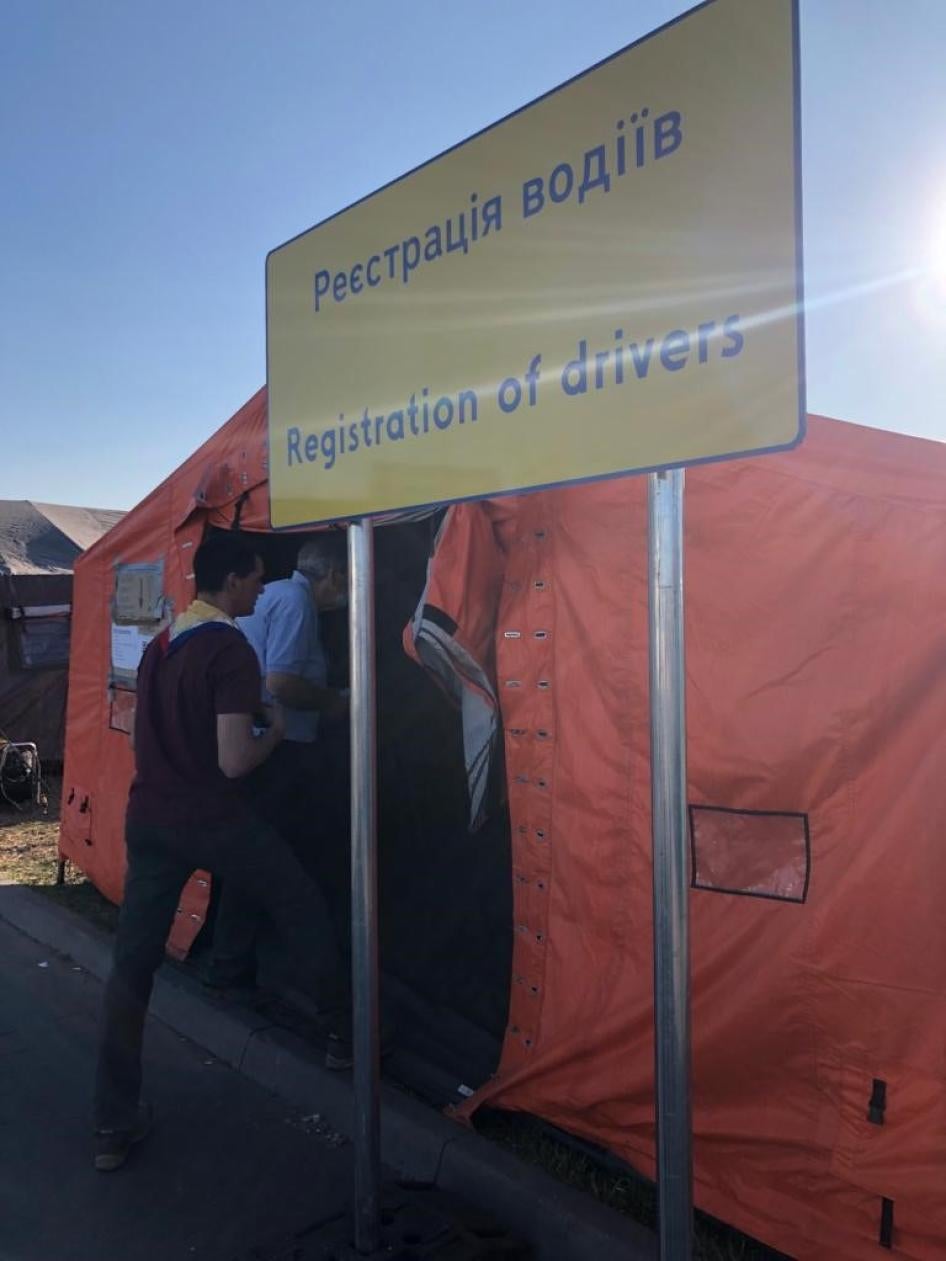
At the Medyka border crossing, Human Rights Watch observed that, and interviewees confirmed that, volunteers provided almost all goods and services, including food and hygiene products. The reception centers in Przemyśl and Korzczowa were entirely volunteer-run while centers in Rseszow, Kraków, and Warsaw were run by a mix of government employees, private employees, and volunteers.
Volunteers and nongovernmental groups also coordinated and provided additional housing, transportation, food, and other supplies and services in Warsaw, Kraków, and Przemyśl, including at train stations serving as hubs for refugees arriving and traveling on to other parts of Poland or Europe.
Volunteers and nongovernmental groups have stepped in to help reduce risks of trafficking, other exploitation, and abuse and to provide targeted sexual and reproductive health care and services for gender-based violence survivors, including helplines with Ukrainian psychologists or gynecologists.
Joanna Piotrowska, president of Feminoteka, which offers help to women experiencing violence, said central government assistance could facilitate providing more services, faster. “There is no support from the top – it is completely at the grassroots level,” she said. “It’s appalling that up until now, even in the face of war and the scale of the crisis … there is no…organization or coordination by the government.”
In mid-April, Poland’s government announced funding for local organizations to help refugees from Ukraine following a fast-tracked process under which there was no open tender. Organizations applied directly to the government, which approved recipients without a transparent process. Many of those selected are affiliated with the Catholic church or known government allies.
Among the top ten recipients is the National Guard Foundation, associated with nationalist Independence Day marches and already funded heavily by the government’s Patriotic Fund. Its leader, Robert Bakiewicz, previously made anti-refugee statements regarding the Poland-Belarus border. Other groups working with refugees from Ukraine criticized the choice, noting they had applied unsuccessfully for funds.
Heightened Risks of Gender-Based Violence
Risks of gender-based violence, including rape, sexual assault, and trafficking and other exploitation, increase during conflict and displacement and tend to disproportionately affect women and girls. The United Nations Office on Drugs and Crime, United Nations Refugee Agency (UNHCR), UN special mandate holders, and international humanitarian aid agencies have warned of particular risks of trafficking and exploitation for those fleeing the war in Ukraine, in part due to high numbers of displaced and refugee women and children.

A protection specialist at a humanitarian aid agency said that the refugee demographics meant “all the red flags went up” immediately. She said that rapid awareness by authorities in Poland and civil society is positive but does not eliminate concerns: “[I]t’s the perfect scenario for all sorts of abusers and perpetrators, but I think [there is] an overall much broader understanding of those risks than in other contexts.”
Lack of coordinated and systematic protection measures at border crossing and reception sites in Poland leaves gaps that can create opportunities for potential abusers. Human Rights Watch spoke with four women refugees who said they had been approached by unknown men with suspicious offers of housing, jobs, or transportation, and one who had experienced attempted trafficking and exploitation. Five volunteers or aid agency staff working at border and reception sites said that they had experienced or witnessed incidents in which unknown men appeared to pose security risks to refugees.
A 41-year-old woman who traveled from Rivna with a friend and each of their daughters, said men without badges or vests indicating they were volunteers approached them at the border offering them housing or work. “They said, ‘Come with us, we have a job for you.’ But we didn’t think it was safe,” she said. Similarly, at Warsaw’s central train station, she said, men were offering refugees work and housing for one or two days. “They were approaching especially women or young women,” she said.
Sexual and labor exploitation remain significant risks that could grow as refugees stay in Poland and struggle to find affordable housing and safe employment, interviewees said. The 29-year-old woman from Kyiv said she had worked as a nightclub dancer in Ukraine and accepted a job at a club offering her a job and housing in Poland via a website. When she arrived, the club’s managers pressured her to do sex work.
When she refused, she said, “The manager screamed, ‘You’re a bitch, you’re not doing the full job, you look tired.’” After a week, she collected some of her wages and left. “They gave me 700 złoty but I had to give them 200 złoty back as a ‘penalty,’” she said. “There are no jokes – this is like a threat. I was scared.” Sex work is not illegal in Poland, but it is illegal to profit from the sale of sex or prostitution of another person or to force or induce people to sell sex.
Irena Dawid-Olczyk, president of the anti-trafficking organization La Strada in Poland, said the woman’s case is typical. She also said some employers hire people unofficially to avoid social security payments for workers, or simply deny people wages. Human Rights Watch spoke with four refugee women who said employers had attempted to hire them illegally or refused to pay them for work.
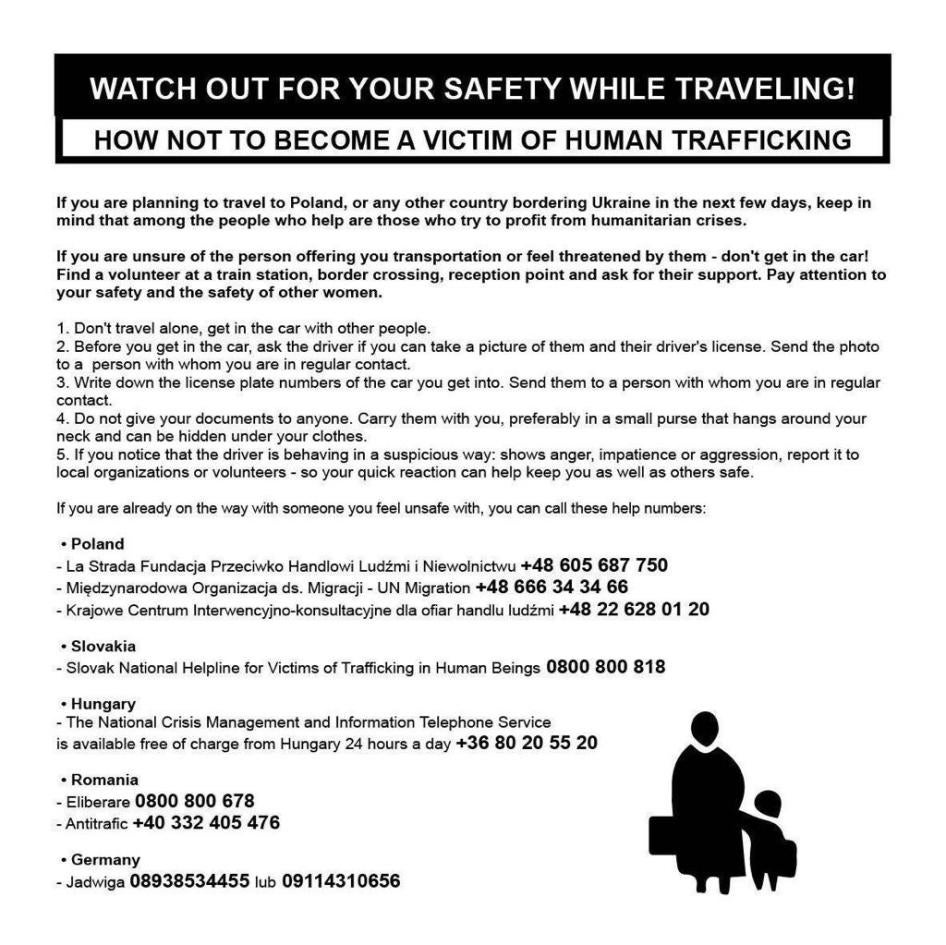
Difficulties finding longer-term affordable housing were beginning to leave some refugees desperate and potentially prone to exploitation or other abuse. A 41-year-old woman from Kryvyi Rih said she had no money to pay the 1,200 złoty ($282) monthly rent soon due for the one-room Warsaw apartment she was sharing with her daughter, 13, sister, 38, and niece, 11. “All the money we had, we converted and spent on food and things we need,” she said.
Lack of Anti-Trafficking and Violence Prevention or Response Measures
Volunteers and staff members at border crossing and reception sites confirmed the lack of systematic measures to identify victims or those at risk of trafficking, other exploitation, or gender-based violence or to mitigate protection risks.
Lack of Screening
When Human Rights Watch visited the Medyka border crossing on March 21 and 22, no measures appeared to be in place to identify people entering Poland who might be victims or at risk of trafficking, other exploitation, gender-based violence, or other abuses. A humanitarian aid provider confirmed this and said he lacked resources to provide such measures. “For gender-based violence [cases], the issue is that you need a private space and you need protection officers who speak Ukrainian,” he said.
None of the five reception facilities visited had measures to screen people for protection risks or identify those in need of specialist services, including for rape or other gender-based violence. A nurse working at multiple border sites said a lack of privacy and dedicated spaces hinders identification of victims. “It is very difficult to know about [potential victims of] gender-based violence at the reception centers because it is hard to find a place to talk,” she said.
Failure to identify victims and potential victims hampers efforts to reduce risks of gender-based violence, including trafficking and other exploitation, and prevents time-sensitive referral of victims to targeted medical, mental health, shelter, legal, and other services.
Lack of Security
People interviewed said that security measures are absent or insufficient at the Medyka crossing and at reception centers.
“The police are here for show, more or less,” said the aid worker at Medyka, referring to an area immediately beyond the border crossing lined with tents, most staffed by independent volunteers from other countries, offering food, drink, hygiene products, and other items and services.
A volunteer working at Przemyśl train station said, “The main problem is there is no organized security presence.” Volunteers at the Korczowa reception center and Przemyśl train station said that constantly changing security measures contributed to risks of trafficking, other exploitation, and other abuse.
Some sites had some security measures for entry, including the Tesco reception center, Ptak Expo Center, Cinema City center in Kraków, and Rszeszow center. However, systems were not applied consistently or across reception sites. The Tesco center coordinator said security checks at the site’s entrance are uneven and that volunteers had stopped multiple people inside the center who did not have proper registration credentials.
Lack of Prevention and Response Systems
Staff and volunteers at the reception sites said no protocols were in place to prevent or respond to gender-based violence.
“Rape is a huge concern,” said a volunteer about risks within the Korczowa reception center. Another volunteer said she worried about potential abuses in isolated, unsupervised spaces such as corridors to the toilets.
Coordinators of the Tesco center in Przemyśl and the Ptak Expo Center indicated they rely on refugees informing volunteers or staff about incidents. “There is no system…. [The refugees] come to us if there is a problem,” the Tesco center coordinator said.
Sites lacked basic prevention measures such as separate housing for women on their own or alone with children. While most of the refugees are women and children, reception facilities also house men and boys who are allowed to leave Ukraine, including teenage boys under 18, men over age 60, those with three or more children, or those with medical or other exemption.
Marta Pasternak, a Ptak Expo employee and coordinator at the site, confirmed that “everyone is mixed together.” People must register and obtain a different wristband to enter each of the facility’s warehouses, but toilet, shower, and changing areas have no locking doors or other security measures and anyone could enter the stalls once inside the facility.
A gender-based violence specialist at a humanitarian aid agency said they are supporting risk mitigation measures at refugee reception sites as well as case management and psychosocial services for gender-based violence survivors. She said centers such as Ptak Expo are slowly establishing basic prevention and response measures.
International guidelines on gender-based violence in crises call for measures including separate, secure accommodation for unaccompanied women and children and gender-separated toilets and bathing facilities with working locks and privacy.
Lack of Training
Only two of the people interviewed who coordinate or provide services had expertise in humanitarian aid or refugee assistance, and many had no skills or experience in providing direct services.
Staff and volunteers said that a lack of training in identifying or responding to gender-based violence meant any response would depend on the individual. A volunteer at the Korczowa center said that if she became aware of a case of rape or other gender-based violence, “I would call the police or the medical [personnel] or find numbers online to call. No one came and said [to volunteers], ‘This is what you should do.’”
Aside from a few humanitarian aid agency employees, no volunteers or staff had undergone any official training. Some volunteers had self-organized training sessions on issues like prevention of human trafficking, but this was haphazard. The La Strada president, Dawid-Olczyk, said they have initiated free training sessions for independent activists.
Protection specialists at a humanitarian aid agency said the proliferation of volunteers poses difficulties in ensuring gender-based violence response in line with international standards. Referring to core humanitarian standards, one specialist said, “[We need to] be acutely aware that when we are talking about gender-based violence, this principle of ‘do no harm’ and a victim-centered approach that we all practice may not necessarily be in minds of [volunteers].” UNHCR had conducted training on risk mitigation and preventing sexual exploitation and abuse in border areas.
Failure to Ensure Comprehensive Post-Rape Care
Those working at reception sites said no protocols were in place to ensure comprehensive post-rape care, which includes administering time-sensitive medications to prevent pregnancy and HIV and other medical and psychological support from trained providers. International standards, including from the Humanitarian Charter and Minimum Standards under the Sphere Handbook, the Inter-Agency Standing Committee, and the Inter-Agency Working Group for Reproductive Health in Crisis, call for clinical management of rape in emergencies.
Laws in Poland severely restrict access to essential sexual and reproductive health care, including basic elements of post-rape care. Emergency contraception, which can prevent pregnancy up to five days after unprotected sex, requires a doctor’s prescription even though the EU has approved over-the-counter sales. Finding a provider and procuring a prescription for time-sensitive care could be particularly prohibitive for refugees who do not speak Polish and are unfamiliar with the context.
A 2020 Constitutional Tribunal ruling virtually banned abortion. While abortion in cases of rape remains legal, a public prosecutor must determine reasonable certainty that the pregnancy resulted from a crime for doctors to legally perform abortion on these grounds.
Krystyna Kacpura, director of the Federation for Women and Family Planning (Federa), said the organization was not aware of women or girls from Ukraine who have been denied post-rape care in Poland, but that it has helped two girls from Ukraine access abortions following rape. Kacpura said their helpline staffed by a Ukrainian gynecologist has also received calls related to sexual and reproductive health concerns such as gynecological infections, contraception, and pregnancy care.
Abortion without Borders, a group of organizations providing information and support to people in Poland seeking abortion, reported helping 267 displaced people in Poland access abortions between March 1 and April 19. They do not collect information on the reasons people need abortion or whether they have sought care elsewhere.
Kacpura said that, like others in Poland, many women or girls from Ukraine who are within the permitted time frame opt for medication abortion using pills, which the World Health Organization says is a safe, non-invasive abortion method that can be self-managed up to the twelfth week of pregnancy. Though Polish law criminalizes abortion providers and not those who have abortions, Kacpura said misunderstanding and fear of Polish law may prevent refugees from seeking care.
The nurse working at multiple border reception centers said post-rape care was unavailable on-site “because there is no space, no privacy. We would have to refer women to the hospital.” She said she was concerned about whether local hospital staff would reliably provide comprehensive post-rape care, including access to abortion if needed, and was trying to independently determine how she could ensure care for survivors.
A 2021 report on Poland from the body monitoring implementation of the Council of Europe Convention on Preventing and Combating Violence against Women and Domestic Violence (Istanbul Convention) noted inconsistent treatment of sexual violence victims by police and medical facilities and insufficient training of medical personnel to provide appropriate care for survivors.
Activists and agencies rely on informal networks of medical professionals to provide essential services, including abortion. A humanitarian aid group working on gender-based violence identified this as a gap and said they are hoping to establish a protocol with the government to ensure clinical management of rape as standard. In March, over 60 international and local rights groups called on international leaders to urgently ensure sexual and reproductive rights of those affected by the war in Ukraine, including full post-rape care.
Lack of Information
General measures to raise awareness among refugees about protection risks are insufficient to ensure they understand the risks, steps to avoid them, and how to report problems.
Poland’s Ministry of Interior and Administration has a Special Section for Countering Trafficking in Human Beings and a National Consulting and Intervention Center for Victims of Trafficking tasked with identifying and supporting victims. The Ministry’s website for refugees from Ukraine provides no details on trafficking risks or reporting mechanisms.
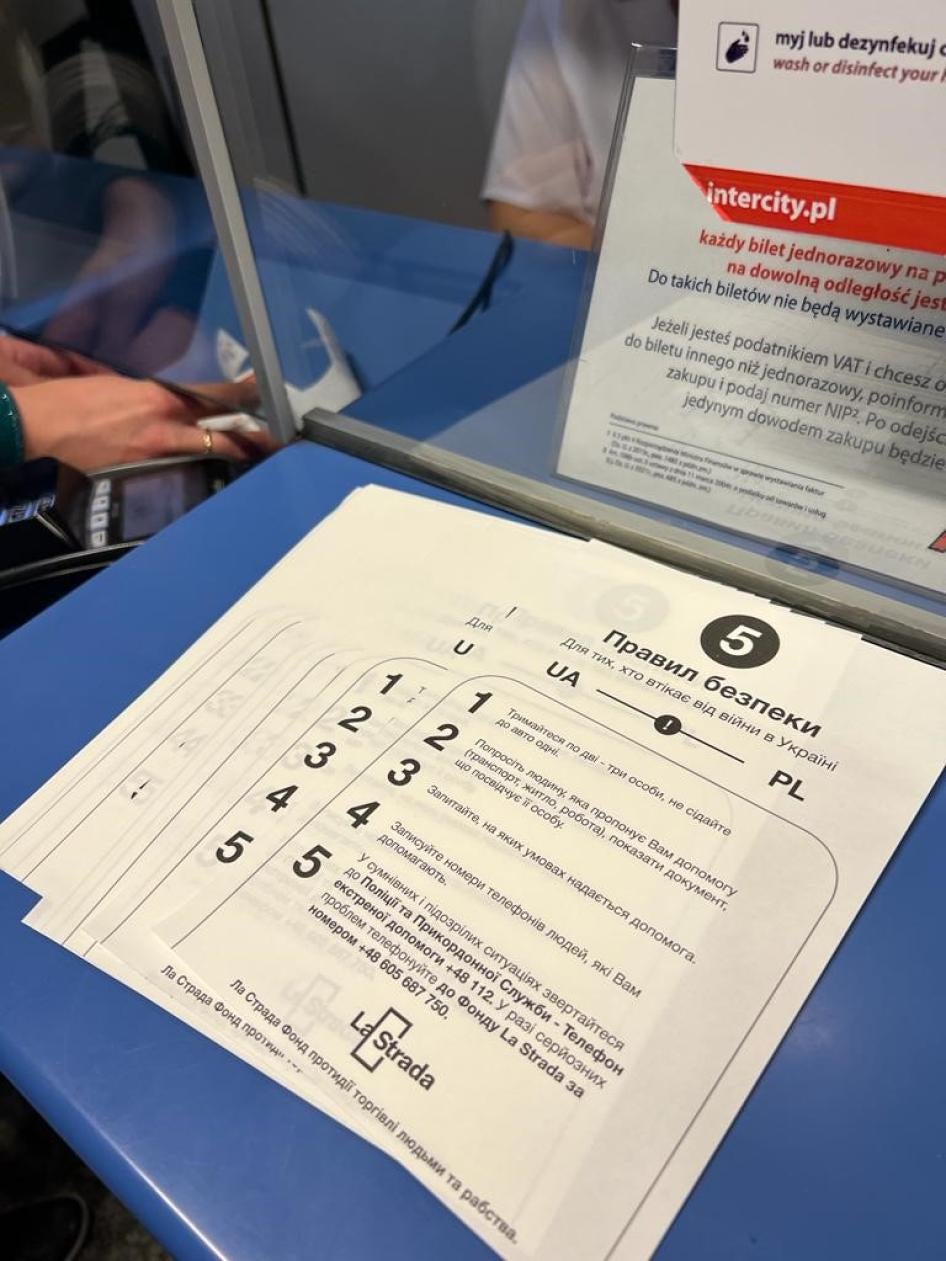
Agencies and organizations including La Strada in coordination with the Ministry of Internal Affairs and the Mayor of Warsaw, the Office of the Border Guard, and UNHCR have prepared leaflets for distribution at border and reception sites alerting refugees to protection risks and providing hotline phone numbers. Piotr Zalewsky, deputy police chief for Podkarpackie voivodship, which includes Medyka, Korczowa, Przemyśl, and Rzeszów, said they produced flyers in English and Ukrainian informing refugees how to reduce risks. They advise people to register at the nearest reception point and not to hand over their phones or documents to anyone and provide phone numbers for police and other 24-hour services. Human Rights Watch saw leaflets and posters at some reception points noting risks of trafficking and listing hotline numbers.
However, some volunteers and staff at sites said such efforts were insufficient. “There is no information given here – just a couple of posters in the [area for] mothers and kids,” said a Przemyśl train station volunteer.
An employee of a Warsaw-based group finding housing for refugees said that they do not systematically give refugees information on risk mitigation and that her organization relies primarily on individual relationships with refugees to ensure safety. “We don’t have a clear system of providing information at the first stage about risks and violations,” she said. “We are conscious we should develop this, but it is a problem of lack of time and resources.”
No information was available in reception sites about how to prevent or where to report gender-based violence. Pasternak, at Ptak Expo Center, said she did not know if refugees receive information about what to do in such cases, “but the refugees ask questions, so they know” who to go to for help.
Lack of Vetting, Security for Private Transportation, Housing
Insufficient and inconsistent measures to vet private transportation and housing also heighten risks of trafficking, exploitation, and gender-based violence for refugees.
Private Transport
Human Rights Watch documented widely varying measures to vet private transportation from reception sites to other cities in Poland or European countries.
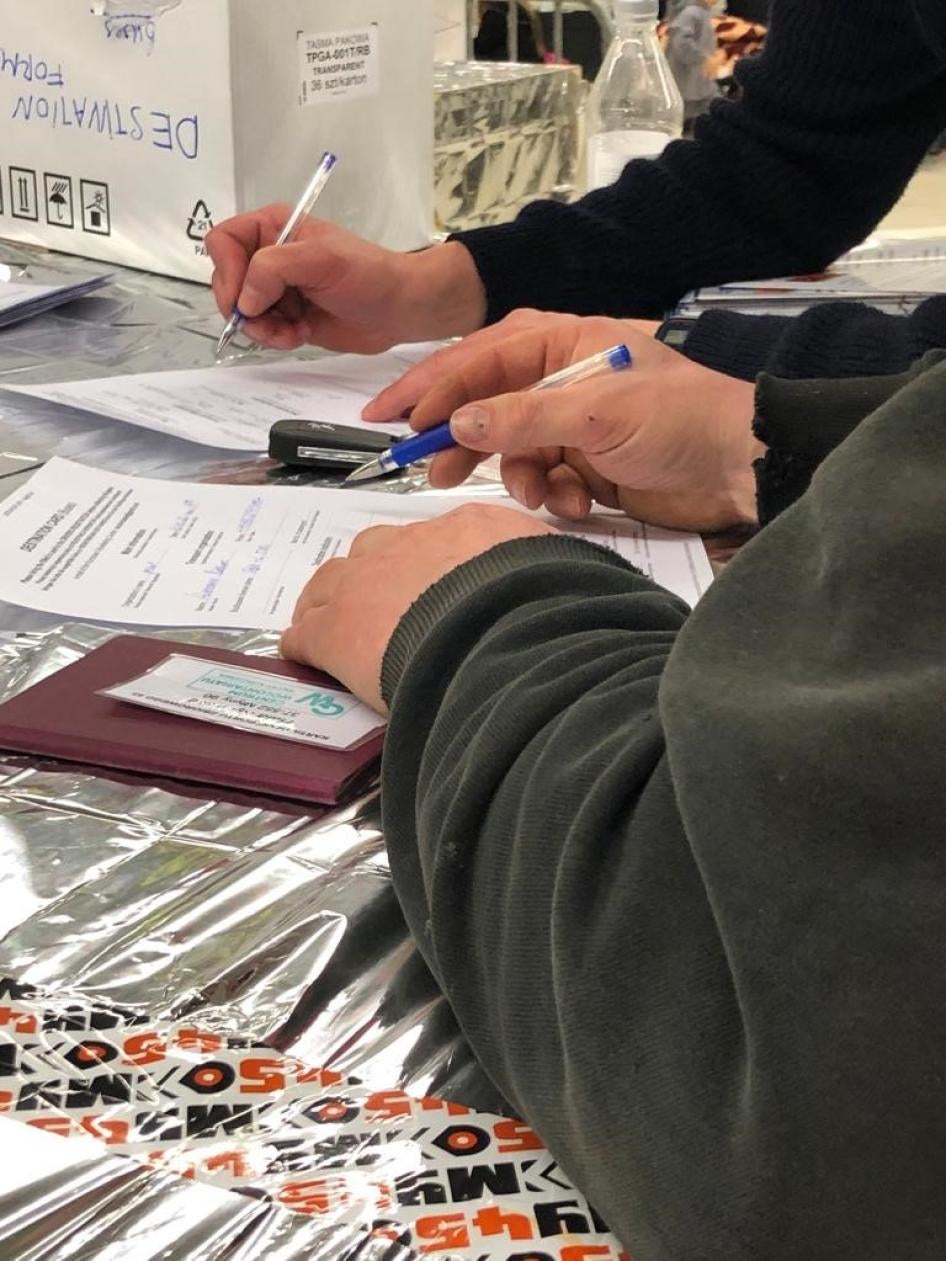
A volunteer-established system at the Korczowa center requires drivers to provide their license plate number and personal information after police check their identification. Police at the center would not explain the details of the process to Human Rights Watch. Volunteers often rely on exchanging personal text or WhatsApp messages with refugees to monitor their safety on the journey. But, as one volunteer said, “it’s a free for all” and there are no clear response mechanisms if they do become aware of problems.
A volunteer at Kraków’s main train station said a city-approved database for drivers within Kraków has increased safety, but slow verification creates gaps. For transport outside of Kraków, she said some volunteers photograph drivers’ identification, keep lists of their refugee passengers, and even have “alarm phrases” refugees can transmit via phone in an emergency. “But this is not something that should be done by the volunteers,” she said. “It should be done by the system.” Although she said she tries to remove posters offering private transport, Human Rights Watch saw some handwritten signs advertising rides outside an information point for refugees at the train station.
The coordinator at the Tesco center in Przemyśl could not confirm any verification system for drivers but said they had begun prohibiting private drivers two days earlier. She said she had removed a refugee woman and her two children from a car in the previous 10 days. “[The driver] was dragging the woman and kids out [of the center] and into the car,” she said.
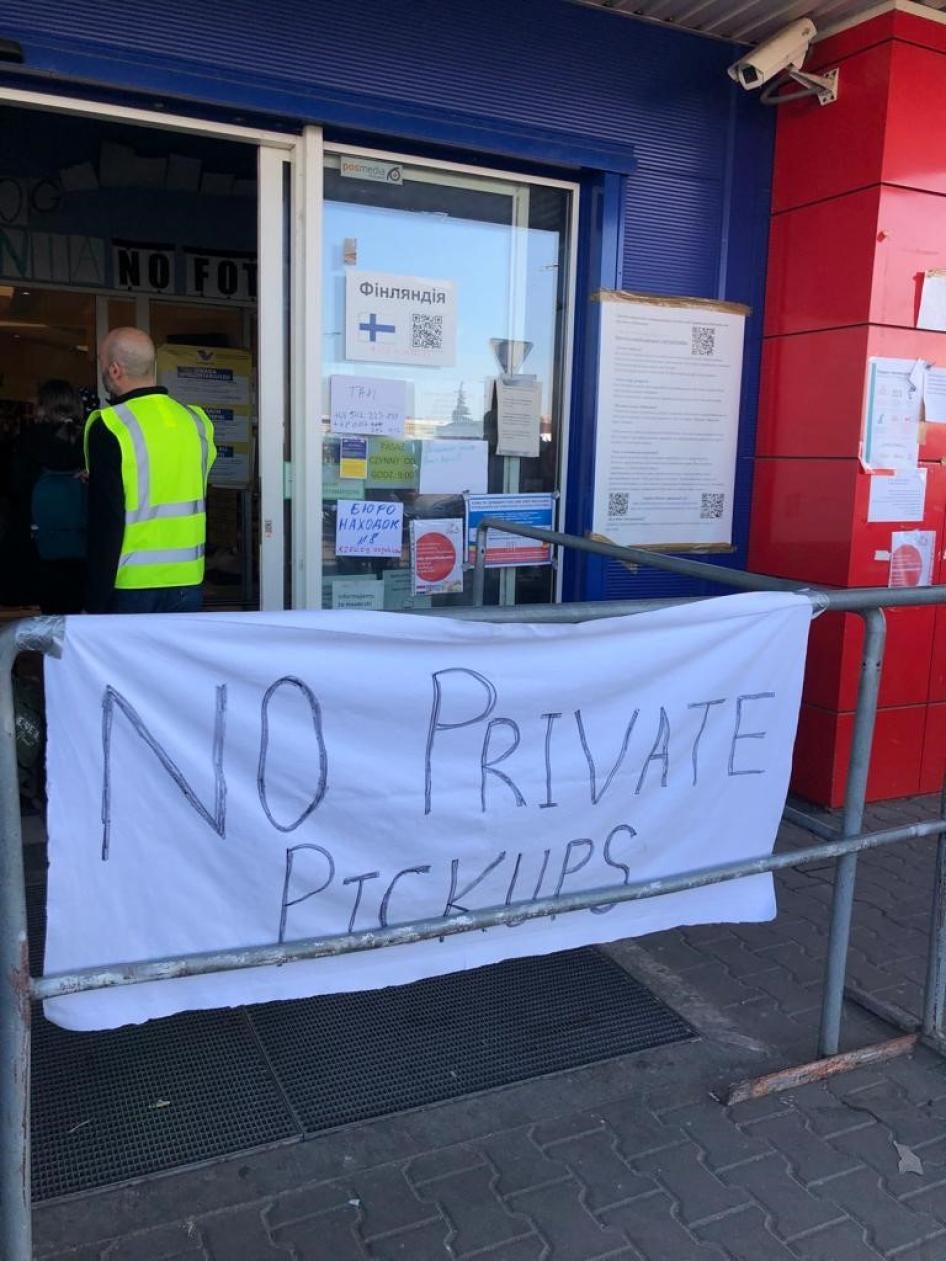
She reported the driver to police, who she said spoke with the man and sent him away, but she later saw him twice more at the center. Police removed him again the third time, but she did not know what action they took.
Deputy Police Chief Zalewsky said that volunteers should register independent drivers’ identification, license plates, and drivers’ registration, and can check these with police on-site who have mobile access to police databases.
A volunteer coordinator at Warsaw train station said they do not screen private drivers whom they match with refugees seeking transport. “People come here or call or write on Facebook if they have free time and a car, [and] they can go and transport people from one place to another,” he said. “Our possibility to check [the drivers] is limited. We are not the police.” He said they advise refugees to check the driver’s ID card and to provide volunteers with information so they know who is traveling with whom.
Over 40 local nongovernmental groups sent an appeal to the Ministry of Interior and Administration, police, and municipal authorities, including in Przemyśl and Rzeszów, calling for uniform procedures to ensure security for refugees at border and reception points. They asked for measures including clear reporting points and procedures for refugee victims of crime, regulation of transport offered by volunteers, and wide transmission of information in accessible formats to refugees. Piotrowska of Feminoteka said they have received no response.
Private Housing
Interviewees also raised concerns about risks associated with private individuals housing refugees. In one widely reported case, a man was arrested for raping a 19-year-old Ukrainian woman who had accepted housing from him via the internet. Although interviewees said that efforts by volunteers and the government to provide organized accommodation have reduced risks, vetting remains unclear and inconsistent. Deputy Police Chief Zalewsky said, “To be honest, it’s impossible to check everyone, but the will is there.”
The Kraków train station volunteer said that educating volunteers about the risks combined with a regional database of verified housing has improved safety at the station, but delays in establishing the database and in verification pose challenges: “The problem with this database is its processing is too long, and people get impatient and they look for other routes of being of service.”
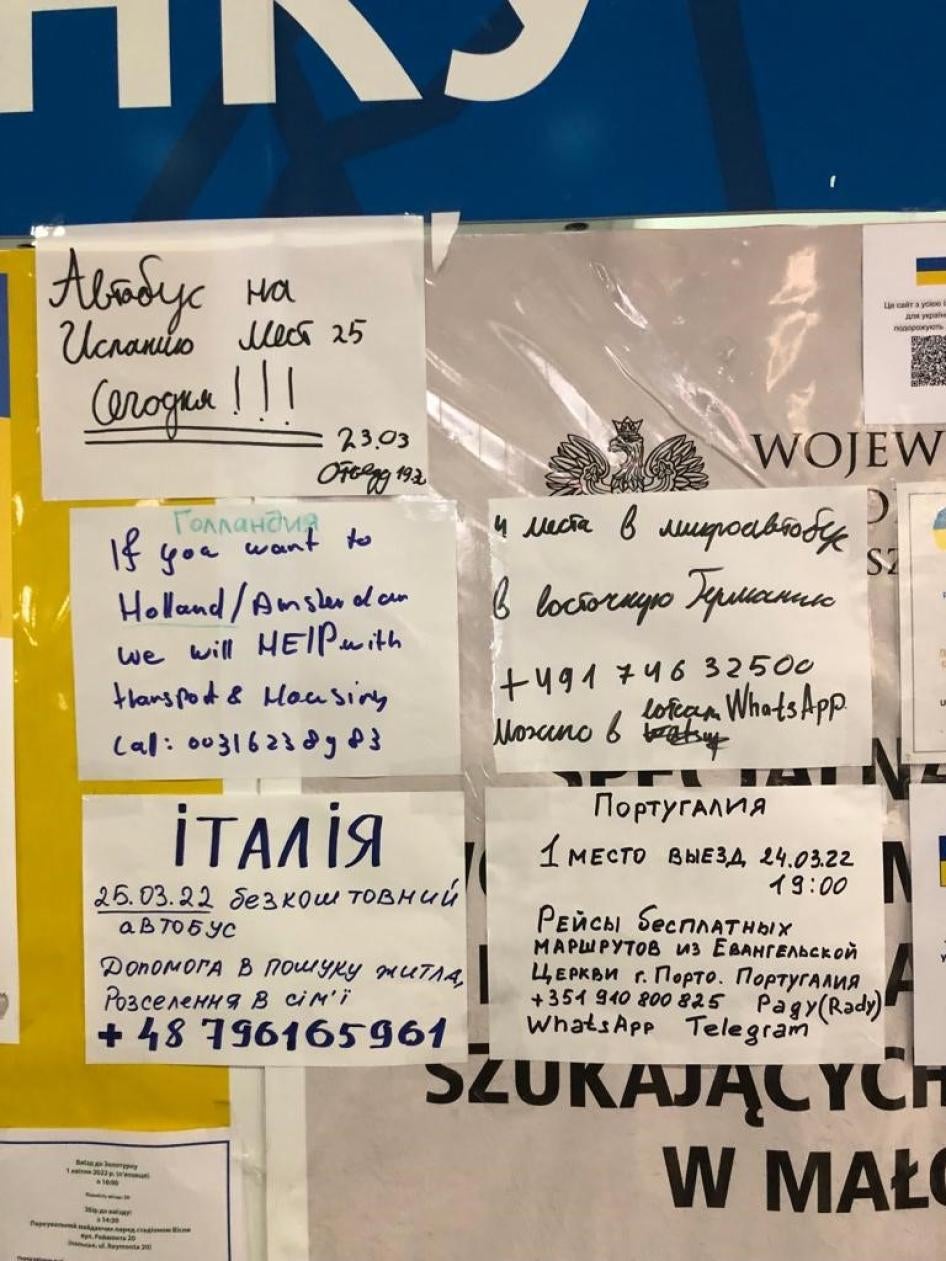
A staff member at a group providing services for people from Ukraine in Warsaw said the city government’s social services were verifying private housing in-person, but could not keep up with demand. She said that in early to mid-March, they were verifying about 20 apartments a day whereas her organization’s database had over 8,000 apartments and has housed about 5,000 people. “On such a scale [vetting accommodation] was impossible,” she said. No centralized system had been established to both ensure refugees’ security and meet urgent needs, she said, and her organization lacked time and capacity to do this independently.
She said the organization has had about 10 reports from refugees of mistreatment by hosts, such as trying to restrict their freedom by taking their passports or insisting they must do an unequal share of housework. In a few cases, refugees reported psychological violence or unpaid labor. In all cases, the organization relocated the refugees and deleted the hosts from their database.
As in some other countries, the Polish government offers compensation, set at 40 złoty per person per day for up to 60 days, for people providing refugee housing. The regulation states that municipalities can condition the compensation on “verification of the conditions for accommodation and meals” and should not be granted if “conditions endanger human life or health,” but includes no provisions or guidance on verification processes or what constitutes acceptable conditions.
While people helping to house refugees may need financial assistance, vetting and monitoring systems should be in place to ensure identification of bad actors for whom financial or other gain would be incentives, Human Rights Watch said. Anti-trafficking and anti-exploitation groups have raised concerns about a similar program in the United Kingdom, which pays hosts £350 ($458) monthly, for inadequate measures to counteract risks of sex trafficking and exploitation.
(Source: HRW )





